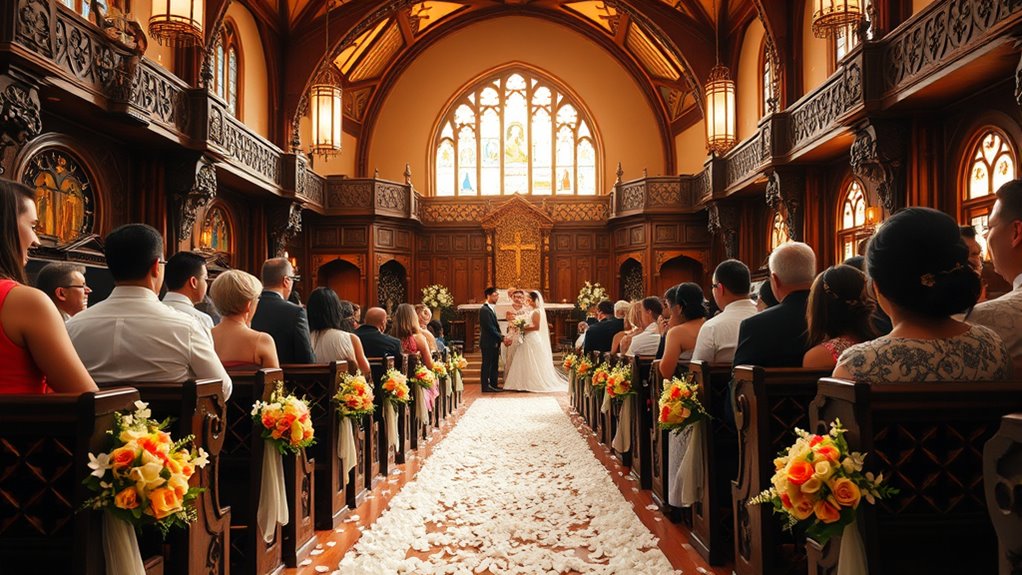To plan a church wedding in the Philippines, gather essential documents like birth certificates, CENOMAR, and valid IDs early. Choose your attire carefully, respecting church dress codes, and book your church date well in advance. Attend pre-marriage counseling if required, and coordinate with church staff about ceremony details like music and decor. By understanding these key steps, you’ll guarantee a smooth, meaningful ceremony — and there’s more to discover to make your day truly special.
Key Takeaways
- Prepare required documents such as birth certificates, CENOMAR, and valid IDs well in advance.
- Book the church early, confirm schedule, and adhere to specific dress code and decor guidelines.
- Attend pre-marriage counseling and coordinate with church staff about music, photography, and ceremony details.
- Choose a suitable date, preferably weekday or early morning, based on church availability and peak season considerations.
- Consider tropical climate when selecting attire and plan for modest, elegant dress styles fitting church requirements.

Getting married in a church in the Philippines is a meaningful and deeply spiritual experience that requires careful planning and understanding of local customs. One of the first steps you need to take is to familiarize yourself with the civil requirements necessary to legalize your marriage. These requirements typically include a birth certificate, CENOMAR (Certificate of No Marriage Record), and a valid ID. If either of you is previously married, you’ll need to present a death certificate or annulment papers. It’s crucial to gather these documents early, as they often need to be certified and translated if not in English or Filipino. You’ll also need to secure a marriage license from the local civil registrar, which involves submitting these documents, paying a fee, and sometimes attending a seminar or counseling session, depending on the local government’s rules.
Once the civil requirements are in order, you should turn your attention to your wedding attire, which plays a significant role in your church wedding. In the Philippines, traditional wedding attire is often elegant and modest, with the bride typically wearing a white wedding gown and the groom in a barong Tagalog or formal suit. The bride’s gown can range from a simple, classic silhouette to a more elaborate design, depending on your preference and the church’s dress code. Keep in mind that some churches have specific guidelines on wedding attire, so it’s best to confirm with the parish beforehand. For example, modesty is valued, and sleeveless or strapless dresses may require a shawl or cover-up. The groom’s barong is often embroidered and made from lightweight fabric suitable for the tropical climate. Shoes should be formal and comfortable, as you’ll be walking down the aisle and participating in rituals.
Planning your church wedding also involves choosing the right time and coordinating with the church’s schedule. Most churches prefer weekday ceremonies or early mornings, especially during peak wedding season. You’ll need to book your date well in advance and possibly attend pre-marriage counseling sessions, which are often a requirement for church wedding applicants. Remember to discuss with the priest or church staff about specific rules, such as the allowed music, photography, and decor, to ensure your ceremony aligns with their guidelines. Additionally, understanding celebrity lifestyle insights can sometimes provide helpful inspiration when selecting meaningful themes or décor for your special day.
Frequently Asked Questions
Can Non-Filipino Citizens Get Married in a Philippine Church?
Yes, non-Filipino citizens can get married in a Philippine church. You’ll need to prepare the necessary legal documentation, such as your passport, birth certificates, and an affidavit of legal capacity to marry. You should also understand the marriage procedures, including obtaining a marriage license and complying with church requirements. Ensuring all documents are complete and valid will help make your wedding smooth and legally binding.
Are There Specific Dress Codes for Church Weddings in the Philippines?
Like a well-choreographed dance, your dress code sets the tone for the wedding. In Philippine churches, attire guidelines typically call for modest and respectful clothing; women often wear dresses or skirts, and men suit up or wear barong. It’s best to avoid casual wear like shorts, tank tops, or flip-flops. Always check with the church beforehand to guarantee your attire aligns with their specific dress code standards.
What Are the Legal Requirements for Bringing Foreign Guests to the Ceremony?
When bringing foreign guests to your church wedding in the Philippines, you need to check visa requirements for each guest’s country. Make certain they have valid travel documents and any necessary visas before arrival. Also, consider guest accommodations nearby, as they’ll need a place to stay. You might want to coordinate with local hotels or provide a list of recommended places, making it easier for your international guests to attend and enjoy your special day.
How Early Should I Book the Church for My Wedding Date?
You might think booking your church reservation last minute is fine, but in reality, wedding planning requires early preparation. To secure your ideal date, you should reserve the church at least 6 to 12 months in advance. This way, you avoid last-minute stress and guarantee everything aligns perfectly. Early booking gives you peace of mind and plenty of time to handle other wedding details, making your special day truly memorable.
Is There a Limit to the Number of Guests Allowed in the Church?
You might wonder about guest capacity and seating arrangements for your church wedding. Generally, churches have a limit on the number of guests they can accommodate, depending on their size and safety regulations. It’s best to verify with your chosen church about their specific guest capacity and seating arrangements early on. This way, you can plan your guest list accordingly and guarantee everyone has a comfortable seat during your special day.
Conclusion
Getting married in a Philippine church is a beautiful journey that blends faith, tradition, and love. With over 80% of Filipinos identifying as Catholic, church weddings remain deeply meaningful for many couples. By following the steps outlined, you’ll guarantee your special day is both memorable and blessed. Remember, thorough planning and understanding local customs will make your wedding truly unique. Embrace this sacred milestone—you’re about to start a lifelong adventure together!









